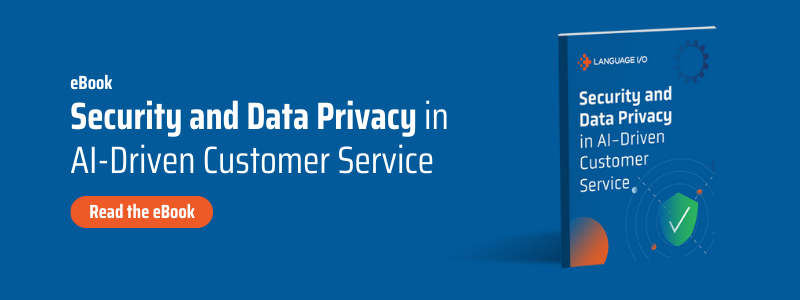AI & Data Privacy Concerns: Does AI Threaten Customer Privacy?
With consumer data privacy concerns and global regulations on the rise, brands are unsure if they can fully employ AI-enabled technology while still protecting customers’ data privacy. Here’s our take.
Subscribe to our newsletter
Share
In order to improve the customer experience, brands are increasingly turning to technologies that utilize AI and machine learning to increase operational efficiency, sales and marketing efforts, and customer satisfaction. But in response to breaches and mishandling of user data collected to enable AI, consumers have grown wary of AI-based technologies and the businesses that use them, to the point where 71% of web users have expressed that they do not want companies to use AI to improve the customer experience if it threatens to infringe on their privacy.
As a result, some brands may wonder if it’s worth it to employ AI technology if it comes at the risk of compromising customers’ privacy. But with AI predicted to power 95% of interactions between customers and brands by 2025, the usage of AI-enabled technologies to meet customer expectations for excellent support seems unavoidable. Brands are left debating if they can simultaneously take advantage of the benefits of AI while avoiding the security and privacy risks associated with it.
Does AI Technology Pose a Threat to Data Privacy?
The answer: not if you don’t let it.
Over the past decade, we’ve seen major scandals related to mishandling of data, such as Facebook’s Cambridge Analytica scandal. While it’s true that there are brands that covertly share and misuse customer data, the vast majority of brands building or employing AI-based technology are not actively seeking to do anything harmful with it.
However, that doesn’t mean that those brands get a free pass when customer data is compromised. The main reason consumers and brands looking to utilize AI-enabled technology should be wary is because of carelessness when it comes to securely handling or disposing of that data. It’s on the developers of AI technology to ensure the proper security controls and privacy policies are in place to prevent customer data from being subjected to a breach.
Using AI Technology While Preserving Customer Privacy
Customer expectations are at an all-time high. To meet those demands, it’s becoming inevitable for brands to implement AI-enabled technology, but not at the expense of customer privacy. In order to verify that a technology provider adequately handles and protects customer data, here are some key details to look out for or ask about when evaluating technologies.
GDPR Compliance with Third Party Verification
Any brand can claim that it complies with the stipulations laid out in the General Data Protection Regulation (GDPR), but only those who have been audited by an independent third party, via certifications such as ISO 27001, have systems and processes in place to actually do so. When speaking with potential technology providers, ask them not only what regulations and frameworks their software complies with, but also the measures they have undertaken to achieve third party verification of this compliance.
Handling of User-Generated Content
Providing customer support often means engaging in conversation with customers over email, live chat, or other online channels. When urgently seeking a solution, customers aren’t always careful with the data they share over these channels. Content in chat logs or emails may contain personal information like the customers’ full name or email address, or even more sensitive data such as their social security number or bank account ID.
It’s critical for brands to understand how their chat, email, and related technology providers handle user-generated content containing sensitive information. Is that personal data encrypted prior to being sent to other processors? Does it live in a company’s database after processing, or does it get deleted? If it does live in a company’s database, how does that company protect it from bad actors? Getting answers to these questions should inform a brand’s decision to entrust an AI technology with its customers’ personal data.
Regular Vulnerability Evaluations and Recovery Plans
In order to prevent external threats from accessing and compromising customer data, your technology provider should be regularly assessing the risk to the data within its database and actively resolving any issues detected. When evaluating technology partners, ask them how frequently they conduct penetration testing to identify vulnerabilities in their systems.
Furthermore, ask to see a summary of their Information Security Management System (ISMS) which defines things like privacy policies and security controls that the company employs. Also ask to see their business continuity and disaster recovery plans, which should be in place to define how that provider plans to continue operations and how to recover its infrastructure and data within set deadlines in the case of a disaster or other disruptive incident. If a provider that you are evaluating doesn’t have an ISMS or business continuity and disaster recovery plans in place, it’s time to run.
Put Customer Privacy First When Using AI
Using AI-enabled technology doesn’t have to put your customers’ data at risk. As long as you work with technology providers who have a demonstrable commitment to protecting data privacy and warding off attacks from malicious third parties, then your choice to implement AI as part of your customer experience should pose no threat to consumer data.
Looking for more information on data privacy and security? Check out our eBook: Security and Data Privacy in AI-Driven Customer Service.


Heather Morgan Shoemaker
CEO of Language I/O
With an extensive background in product and code globalization, Heather founded Language I/O in 2011. She is the mastermind behind Language I/O’s core technology, which eliminates the need to train a neural machine translation engine by dynamically selecting the best NMT engine to translate a given piece of content, and imposing company-specific terminology onto the translation.